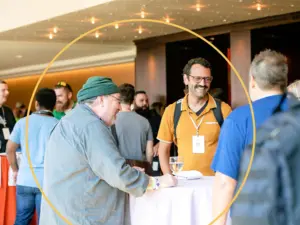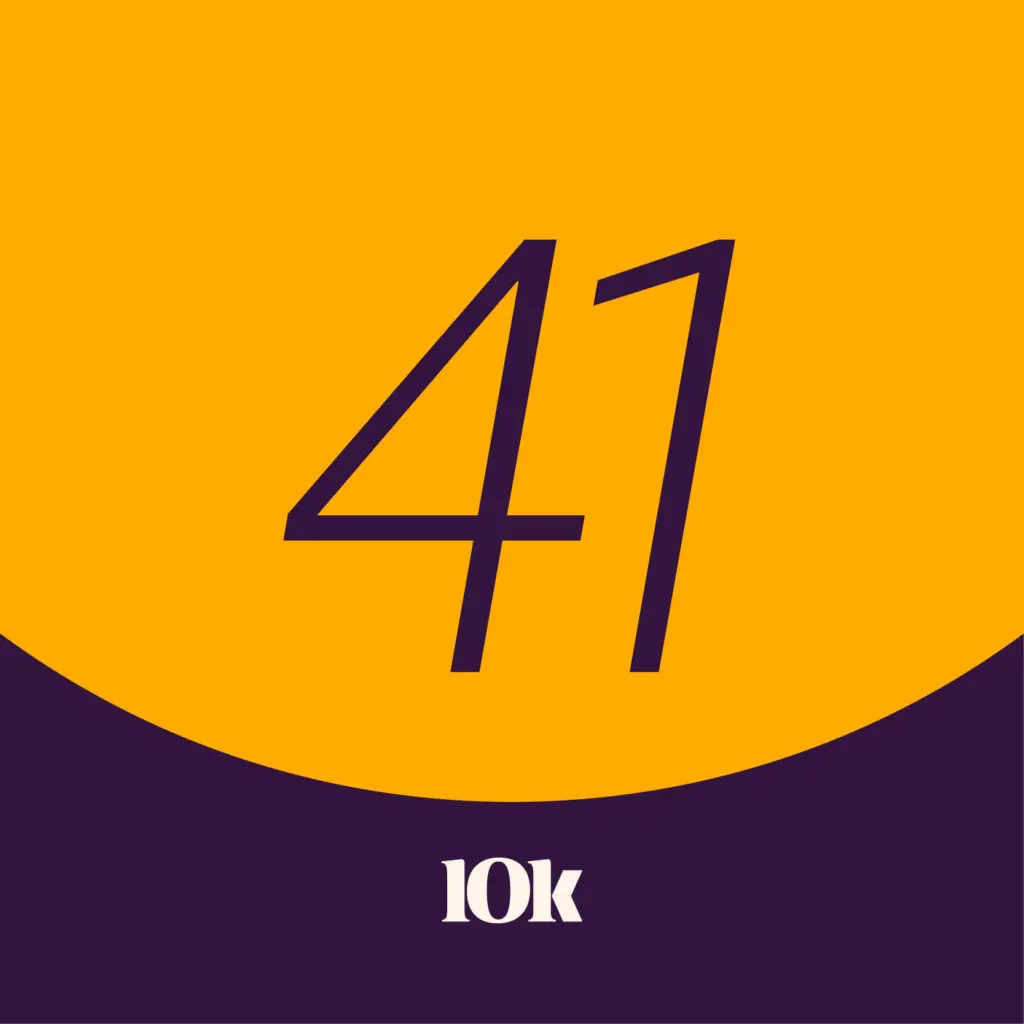What does it mean to find your purpose at work? Why is it important? We talk to President and CEO Meredith Bronk about how she makes time for reflection and celebration. Bronk also talks about how leaders have worked to maintain culture and collaboration with employees working in places across the country, and the globe. What does it mean to feel connected to something bigger than yourself? Explore these topics and more in this episode of our show.
Enjoy!
This podcast content was created prior to our rebrand and may contain references to our previous name (OST) and brand elements. Although our brand has changed, the information shared continues to be relevant and valuable.
Episode Transcript
Kiran: Welcome to 10,000 feet the OST podcast.
I’m joined today by OST president and CEO Meredith Bronk. I invited Meredith on today to talk about something that I’ve been seeing a lot of recently. And it’s really a conversation about how individuals are finding their purpose at work. I wanted to have Meredith on to talk more about this so welcome to the show.
Meredith: Thank you Kiran. Happy to be here.
Kiran: Excellent. So if we’re going to talk about purpose, it makes sense for us to just probably start with the basics. How do you define purpose and what does it mean to you, Meredith, to have a purpose at work?
View Full Transcript
Meredith: I’m super excited to be here, first of all, just to talk about this concept and this topic especially as it relates to leading right now, an organization where ensuring that we provide an environment where people can be their whole true selves, which includes really, truly understanding what makes people whole. And when I think about purpose in general, that’s really what it’s about. It’s about having an understanding of what I believe my true, kind of, calling and opportunity is to be my full self. I wake up every day and say, am I giving– using my God-given talents to the best of my ability every day?
And for me, that’s kind of my purpose and it goes beyond what I’m capable of doing, but it truly is about can I, and am I using my talents to have the maximum impact that I can have in this world to improve the world that’s around me. And I recognize that that’s what it is for me. And when I think about what it means for me as a leader, it means am I thinking about, and conscious of, that we have lots of individuals who have lots of different things that are important to them, and how are we tapping into and creating an environment where folks can figure out what that is for them, and then have an opportunity to make it real.
Kiran: So a lot has changed we know. We’ve changed the way we work. We’ve changed a lot of the things that we do every day. And I feel as though purpose fits into this equation a little bit, and I wanted to dive into that a little bit with you. So with so much changing in people’s day-to-day reality, how do you think people have started to look at their own purpose differently, especially in this moment in time?
Meredith: Yeah. Yeah, I think it’s been really interesting when I think back in over the last two years, we’ve had an opportunity to reflect. And when I think about– we’re in technology, right? We have the opportunity, we have the privilege really in our industry to work from home. We have a privilege to think about how and where we work.
It truly is a privilege. And in that privilege comes the opportunity to ask all sorts of questions, including I thought I knew what I wanted to do and how I wanted to do it in the way that it was showing up. And I think there’s a lot of folks right now who in the uncertainty that has been presented, maybe, in a way that we hadn’t expected, there’s been some uncertainty around purpose around “I thought I knew. And now do I really? Can I really get my hands around and my arms around what it really means?” And whether that’s you know, how I balance my home life with my work life, how I’m thinking about the impact I want to make. Both, I think in, “I love my job and I love my work. I want to get back. I want to do more. I want to think differently.” As well as folks who are like “You know, I gave up so much and was sacrificing so much and I had no idea.” So I think there’s just been this big shakeup and the folks that I talk to both inside of and outside of OST, there’s been just this questioning because we have the privilege of options.
Really. There’s been some great new questioning and the opportunity that we have as leaders and that I’m super excited about as CEO of OST. The great opportunity that I have is to have the conversations with folks every day and say, whether you’re getting that directly from your vocation, or maybe you get that purpose from somewhere else, is the work that you’re doing still providing you the space in your life to find that peace, to find that satisfaction in your life as a whole? It may or may not come from your vocation and that’s okay.
Kiran: So Meredith, I wanted to invite you to talk a little bit about the work that OST does. We serve clients in different spaces, doing a lot of incredible work. We do projects working on accessibility and incredible projects where we are helping companies produce things that really make a difference.
And that invites me to ask you to reflect on purpose as far as our clients are concerned. So how do you reflect on that in addition to your role as president and CEO?
Meredith: Yeah, that’s a great question. Because as CEO, I’m obviously thoughtful about kind of how we do what we do and your recent podcast with Andrea thinking about accessibility and some of the other things from my perspective, it is really, really important. And I talk to leaders with our clients all the time and not only do they talk about and think about connecting with what it means for their teams to make sure that they know that their work matters, but to make sure that the products and services that they are delivering ultimately connect to the purpose of their consumers.
So thinking about what actually drives consumer behavior, you know, we do a lot of consumer research on behalf of some of our clients, but at the end of the day, it’s like, do we understand and are we connected to the consumers and customers that we’re trying to reach in our products and services? Because if we don’t understand and can’t connect to the essence of what makes them who they are and why they’re buying and why they’re going after products goods, product services, whether they’re ours or somebody else’s.
I think that really becomes inherent in helping also to connect to the employees to say, “Your work matters because it matters to the people who are ultimately consuming the goods and services that we’re producing” and that chain and making the connection in that chain is really, really, really important in keeping people engaged in the work and in helping your consumers understand ultimately what you’re trying to do. So effectively being able to communicate that.
Kiran: Thank you. I know you’re intentional as CEO and president about giving people the time to reflect on and recognize how their role plays a part in something bigger. So is it an organization’s responsibility to create that kind of space? I mean, I know you emphasize it, but what do you see amongst your peers and others?
How are they creating such time for reflection and for helping people find their purpose?
Meredith: Yeah. I think it’s an interesting time right now. When I see personally, I believe in business’s responsibility to not only do well as a business, but to do good in this world. We have the opportunity as businesses to provide an environment for places where our employees can be whole humans.
It’s something that I firmly believe in kind of in my core. So I make space for it. I make space for it for me. I make space for it, for my leaders. I am intentional about it. Not only because it’s important to me, but because I believe that as businesses, if we don’t make it our responsibility and make it a priority that we are losing out and really, I think failing what our responsibility and opportunity is at large to society. I think we have a role to play. Now it doesn’t mean that all businesses are doing that, but I think we have an opportunity and a responsibility to do that. So for me, it’s about demonstrating it first and foremost, we talk about it inside of OST.
I talk about what it means to bring your whole self. We talk about listening and learning. I demonstrate gratitude. We talk about gratitude. We talk about celebration as a practice and not just a mindset, you know, there’s little things that I think that signal to folks that it’s safe, that it’s okay. And that we’re imperfect. Right? I mean, we have days, I have days we all have days and it’s just as important to say I’m struggling to find the space, or I feel like I’m failing at this purpose that I call or I’m not using my gifts the way that I know that I’m intended to. And it’s just as important as a leader to recognize those shortcomings when I feel them as it is to proclaim those places when I feel like I’m doing it really well. And I know for me whether it’s through weekly videos that I send out right now to our team, whether that’s through fresh air communications, you know, some of the other ways that we communicate regularly with our team, finding those places and spaces and encouraging others to do the same.
I just think those little practices matter and it starts first with modeling it. Which I take that responsibility seriously.
Kiran: I feel like in some ways you make sure to invite all aspects of a person to the office when they show up, whether that’s remote or in person and you are encouraging it almost.
And I think that you’re saying that because we have many parts of us, but all those parts show up on a given day and that’s probably intentional.
Meredith: Absolutely, it has to be. You know, I was talking to somebody the other day outside of OST and we — everybody’s on these calls these days. And one thing that has been interesting to me is when we do calls, oftentimes at OST, we have our cameras on.
It’s a default inside, largely inside of OST that we have our cameras on because we want to make connection with folks. So if I’m on a call with one of our– somebody on our team and a child shows up in the background, we stop what we’re talking about and welcome that child into the background. It’s like, “Hey, how are you? Come on in.” Or a pet or whatever that is. We welcome that part. It is an encouragement because you know, in that moment, when someone’s child shows up in the background that it is this like, oh my gosh, what just happened? Right. And you want to show that that’s okay. But I was talking to somebody outside of OST and it’s like a, they joined an organization where no one has their cameras on.
And it’s like, that feels weird to me. Or when they do, it’s like, make sure nobody’s in the background. Make sure that I don’t know what’s happening in your household, behind you when I’m on the phone with you. It’s like, my take, those kids and those dogs and those pets are there in the background, whether you know about them or not. Better, that you know, better, that you have an understanding of what’s happening because when and where you do, you can help to enable someone’s success. And at the end of the day, at the end of the day, for me, that’s what it’s all about.
I was looking a couple of weeks ago and I read a Simon Sinek quote and I’m not going to get it totally right. But it was about the idea that valuable organizations are organizations where the employees are invested in its success, even after their tenure.
And it’s the idea that people truly, who work for an organization, are thoughtful about it being successful, whether they work there or not. And I got a thank you note from a former employee just a couple of days ago. And it was really interesting cause he just sent a note that said, “Hey, I was reflecting on my experience at OST and I wanted to thank you. For what you’ve done for me” and kind of he’s moved on, “but I just wanted to thank you for the experience that I had at OST and how you allowed me to grow. “And I shared with him that Simon Sinek quote and my interpretation and that extrapolation that I made was I think valuable organization both have employees who invest in the success of the organization long after they’re there.
I also think that they’re surrounded with individuals and we make investment in people also recognizing that their careers are going to take them other places. And when we’re all invested in each other’s success, whether it’s inside of this business or outside of this business, that that’s what drives true value both for us individually and collectively. To me, that’s where you get to people’s purpose. That’s where you create the space. And if you believe that that’s true, like I believe that that’s true, that that is the true measure of value, that is the true measure of worth of a business, of a collective, of a community that we’ve created, that you have to leave space for humans who come into your life will make that real. And if you’re not attaching to that reality, then you can’t make that true. You can’t make that true. So for me, it’s all interconnected.
Kiran: That that is inspiring. Truly. I wonder how you, you take some of your intention and your encouragement and transfer that to those around you. So other leaders and managers that you’re working with, so they feel equipped to have conversations with the people that they manage and, and that report to them.
So these kinds of dialogues are happening throughout the organization. How do you sort of transfer some of that energy around you?
Meredith: Yeah it’s not easy always, Kiran. Because everybody has different styles. And I think it’s important, what we talk about at least, is it’s about the mindset. It’s about the openness. It’s about the bringing your whole self. It’s about creating an opportunity in an environment where folks are welcome and belong and the way in which you do that is yours. But that you do that is expected. And interestingly, and you know, this obviously inside of OST, it’s everyone’s responsibility to make that so. Definitely as leaders, it’s our responsibility and we don’t always get it right. I think that’s where grace comes into play and other things where we try to give people the space. But for me, when I onboard new leaders at the executive level, I talk to them about that.
We had last year, we gave away, I gave away to my team 52 gratitude cards along with a little booklet. And I was like, “52 cards along with a booklet. Once a week, you should be sending a handwritten gratitude note inside of OST, outside of OST. Don’t really care. 52 note cards send one a week.” Cause it’s a practice that I believe is an important practice that creates a mindset that is consistent with how we lead and how we think at OST.
That’s a behavioral expectation. So I also try to signal little things like that. I don’t dictate who they send their, what they recognize, but that it is a behavioral practice. So we try to do things like that, that helped to set that mindset and also reinforce.
I was just looking, because we are in a season of gratitude, I was just looking the other day. We also use Slack at OST and we have a props Slack channel where people can send gratitude and little recognition notes to each other. Really it’s a place for recognition of one another. And if you’re going to perpetuate a culture 0f gratitude and a culture of this purpose and this recognition of each other’s whole selves. For us, we do one of the ways that we do that is on this props channel.
And I just looked and in the first 19 calendar days of the month, there were 121 discreet people recognized on our props channel in the first 19 calendar days, which is probably like, I don’t know, 14 or 15 actual workdays. 121 individual shoutouts that we put out on the props channel, just folks for different colleagues.
And for an organization of our size, to me, that’s a signal that it’s working. It’s a signal that people feel seen, that their work is recognized, that what they do matters and all of those things, to me, feed this idea that my purpose, why I do what I do at work matters.
And kind of getting back to your core question. When I think about, a little tangent, I remember having a conversation with an employee a couple of years ago, who’s on our operations team. And it was a conversation about where I’m like, you know, OST is the place where you’re– you know, hire you people whose value and values align and give you a place to do what you love to do. And if we do those two things well, we’re going to thrive. Right. That’s kind of our equation for success. And he’s like, “I hate to break it to you Mere, but you know, being the best ops person, like wasn’t my calling in life. That’s not what I wanted to do when I was a kid growing up” and I said, “Okay, what did you want to do as a kid growing up?” And he said, “I wanted to be a teacher and a football coach.” And like that, “I have this purpose to teach kids.” And for him, it was like to be this a football coach. And he said, “And then I realized I could never teach.”
And I laughed. And I said, “Okay, But you coach football. Right?” And he said, “Yes.” And I said, “Does being at OST right now today in the role that you’re in, allow you to do that?” And he said, “Yes.” And he said that is his purpose. His purpose is to be with these kids and to shape these kids through football every day.
And working at OST allows him to do that in a way that he feels full. In a way that he feels like he’s able to find that peace and purpose in his life, his vocation, and he loves his job. And part of the reason he loves his job is because he’s really good at it. He is seen as a whole person because he knows that part of what we want him to do is to be a fantastic football coach because that’s part of what makes him whole, so we accommodate that.
He gets his fall seasons off. He works weird hours when he needs to in the fall. Cause that’s part of what makes him whole, that’s the accommodation when I think about purpose. And that goes beyond just the vocation and for some people, we’re fortunate enough to live that purpose in our vocation and for others, they’re not. But our opportunity in business, when you’re really in touch with what makes people tick, the opportunity in business is to get in touch with that and then create the opportunity for folks to be able to find that realization for themselves.
Kiran: And I think I would go as far as to say, you invite a reflection on this balance and encourage it amongst teams. You want people to have this conversation in this space.
So they’re being reminded and, and being thoughtful about thinking about how they fit in into a larger purpose.
Meredith: Yeah. And some people in that reflection find out that, that it’s not here and that’s okay. I think that’s part of it too. It’s like in those moments and in those seasons, especially right now, like folks are making all kinds of choices, whether that’s, I’m going to decide to not work or to change how I work and where I work and when I work and what my family needs for me right now, or I’m going to take a year off or I’m burned out or whatever that is. People are making all kinds of choices, but when you leave the space for people to truly decide and find that introspection to, to find that calling and then make it okay for them to make the decision that’s best for them. That for me, I think is — that’s the space that we try to create, even if it means that what they ultimately decide might mean that they have to find it outside of OST. That’s okay. That’s okay.
Kiran: I think that the world and the events that occurred created just a blank slate for people that was in some ways forced, but that might not have occurred if it wasn’t for the exact series of events that occurred. Right? And so people use that as they saw fit and they started to ask themselves questions that maybe they had pushed to the side. Right? About my purpose and about what makes me me and about what makes me happy. And, and we have to just recognize that I think.
Meredith: Yeah. Yeah. And we got older. Like, you know, I mean, I don’t know, I got older it feels like. I think that there’s also just some natural evolution in life that also just continues to happen.
I was talking with Jim VanderMey our Chief Innovation Officer, and we were talking about how digital has disrupted. And one of the things that we were talking about is, you know, the great resignation and some of the moves that people are making right now. And I think about that in purpose much has been written about the great resignation in finding purpose.
And Jim and I were also talking about, if you look at how digital capabilities have accelerated how people behave, whether that was like how people shop. And he said, you know, middle-class Americans have always wanted to accumulate. Amazon made it easier. You know, people have always been inclined to move in times of change and LinkedIn made it easier. This is one of the first like downturns where we’re all online and digital is in. And so it’s like people are moving around. There’s also a reality that how and where we’re living and how and where we’re doing this reflection and the space that is created right now, the environment within which that space has been created looks different than the last time any of us had space.
So we also have to just be okay with that. That’s the truth and it’s not all good. I just like, I’m just going to throw that out there. I think it’s truth. And we have to be, I think it brings intention — makes intention all the more important, because we can be bombarded with information with stuff. So what we consume and how we consume it and how we spend our time consuming information in that introspection in finding that purpose matters. All the more now I think as we find this space and we spend some time holed up and hanging out, we have to be intentional about the things that we consume and the information that we surround ourselves with.
Kiran: I keep coming back to just that you talked about time and you talked about energy and I feel as though people realize that there’s a finite amount of that and what am I waking up and spending my time and energy on today and, and does it bring me happiness and, and whatever it is, it’s going to change on a given day.
But just that evaluation and that, that understanding that I don’t have an unlimited amount of this and I want what I do to matter. I think that helped people sharpen this look at purpose.
Meredith: I totally agree. And I, in general, love what I see. I believe that people are being intentional. They do want to do things that are energizing. They’re choosing to be energized. They’re choosing to engage in ways that matter. I look at the decisions that the OSTers around me, the decisions that they make, the work that they’re putting out, the creative energy that they bring, it is inspiring. It is inspiring every day. So the choices that I see folks make it truly is both gratifying and inspiring every single day.
Kiran: I love that. As you look forward or look ahead, is there anything that you think people should be asking themselves going forward? I mean, we’re here in the precipice of a new year or anything you’re asking yourself as you continue to think about this conversation about finding purpose.
Meredith: Yeah. You know, I was thinking about it actually as we’re on the precipice of a new year and I think everybody looked coming into 2021 with this, like, let’s get back. We’re out of 2020. And that was, we end 2021, you’re like, huh, it might not have been this big exhale that we had expected in 2021. And so as we look to ’22, I do feel like for me, there is this intentionality and not like expecting some manufactured release valve. So instead, really stepping into it with a place of it will be what I make it, and there’s some stuff I can’t control and I’m going to be okay with that. I’m going to take it as it rolls and I will do everything that I possibly can every day with my energy, with my choices, with my purpose, cut myself a little bit of slack and a little bit of grace and do what I can to extend to the same to others. And at the end of the day, going into 2022, if I look at what’s happening kind of around the entire world, that really, for me is kind of my hope for ’22, that we find a place for others, with others, that we accept our purpose and that we see that it goes beyond us as individuals. That we see our opportunity of the impact that we can have and can positively have on the world around us. And that we choose that into 2022, because we can, because it is a choice and that we have that opportunity to choose it and to extend some grace for those around us, who I hope or trying to make the same choice.
Kiran: That’s it right there. Meredith it is what we make it and let’s make it something good together. We’ll talk to you later.
Meredith: Bye. Thanks Kiran.





